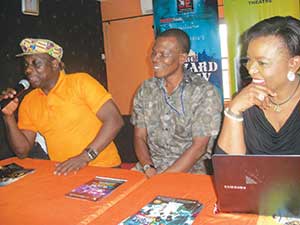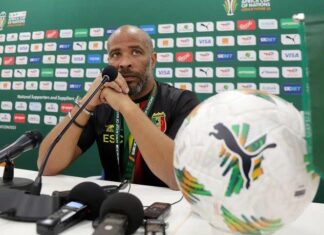Last weekend, the Thespian Family Theatre and Productions staged The Wizard of Law, a play by Zulu Sofola. Directed by Sola Roberts, the production featured Femi Jacobs, Iyke Okechukwu, Ife Salako (of Naija FM) and the Thespian Family Theatre Troupe. The play was staged in Ikoyi, Lagos.
Founder of the production company, Ayo Jaiyesimi, said during a press conference on March 19 that the idea of staging the play in Ikoyi was to create new venues where plays can be staged in Lagos, since there is a shortage of such venues.
She said the next play the company will be staging is Femi Osofisan’s Midnight Hotel that will be directed by Israel Eboh. The venue is Agip Recital Hall of the Muson Centre, Onikan, Lagos and the play will hold two shows each day on April 4 and 5 and 6 at 3.30pm and 6.30pm.
According to her, next year will be very loaded for the group. “We have a lot of productions. We are going to have The King Must Dance Naked, The Trials of Brother Jero and Midnight Hotel – which I am very excited about. We have also decided to take The Gods are not to Blame outside the shores of Nigeria.”
The Thespian Family Theatre only late last year staged The Gods are not to Blame by Ola Rotimi at the Muson Centre.
“Together with Heavy Wind Media UK Ltd. and in collaboration with Ola Rotimi Foundation, we will be taking this play out of Nigeria, and our starting point will be the UK,” Jaiyesimi said.
She explained that her company is very proud of the productions they have lined up for the year. The Gods are not to Blame will be staged at the Lost Theatre in London on April 26. Jaiyesimi said they are looking forward to meeting Africans during the production.
“They shouldn’t just be hearing bad news about the country; but should all come and see what can come out of Africa and celebrate our heritage,” she stated.
Creative Director of Heavy Wind Media UK Ltd., Lookman Sanusi, linked up via telephone to say that the UK production of The Gods are not to Blame will take the form of a film play with veteran actor, Dejumo Lewis, playing the role of narrator.
He said the film play approach has something to do with the Nigerian film industry, well known as Nollywood, phenomenon that also holds sway in the UK.
“A lot of Nigerians come out to watch Nollywood film premieres; the ones from Nigeria and the ones that are actually produced in the UK. The idea of the film play is a multimedia concept that is not new, and we are going to have a big screen and a live performance. The idea is to make sure that we synchronise action right from the screen down to the stage. We will make our narrator the god of the story, just the way Ola Rotimi intended it,” he said.
The cost Theatre where the play will be staged, he said, is fairly new and has had a couple of productions from Africa.
Eboh said he was excited when called upon to direct Midnight Hotel because in Nigeria’s election year, it seemed there were insufficient statements from the art perspective.
“When I was invited, I said, ‘oh, finally, there is someone somewhere who also feels the way I feel in trying to build a better nation. Midnight Hotel is a play set in the Second Republic that tries to analyse the transition from military to civilian dispensation and the disappointing role the politicians were playing,” he said.
He explained that among the salient issues Midnight Hotel tackles is the failure of the electorate to play their oversight role and that at the end of the comedy the audience will not only laugh but see themselves more resolved to create the Nigeria of their dreams.
Some members of the cast of the different productions, including Rotimi Fakunle, Abiodun Kazeem, Ife Salako and Muyiwa Osinaike, were at the briefing to lend their support.















